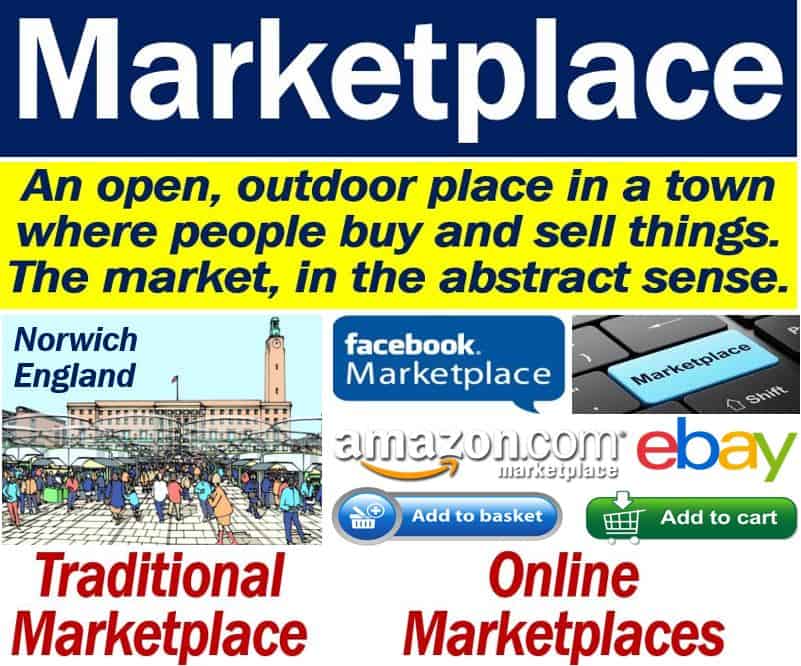The term Marketplace may refer to an open space or square in a town where people buy and sell things, i.e., a street market. It also means ‘the market‘ in the abstract sense. For example, for a product to compete effectively in the marketplace, it needs to sell at the right price.
In the world of health insurance, a marketplace is a service that helps people shop around for affordable health insurance, i.e., insurance within most people’s budgets. People can also enroll in such marketplaces. In the US, the federal government operates The Marketplace. Some US states run their own.
Health insurance refers to insurance plans that pay for people’s medical expenses when they need them.
Online marketplace – definition
The online marketplace is a kind of e-commerce website where many third parties provide information on goods and services. The operator of the website processes the business transactions, i.e., orders.
These are the primary type of multichannel e-commerce. According to e-commerce experts, they are also a way to make the production process more efficient.

While the operators of online marketplaces process consumer transactions, participating retailers and wholesalers fulfill the orders. The retailers and wholesalers also carry out deliveries.
Wholesalers sell to retailers and other businesses; they do not sell to the general public.
Modern marketplaces are incorporating advanced technologies such as artificial intelligence to personalize shopping experiences and improve customer service.
Different types of marketplaces
There are several different kinds of trading platforms online. Some began as a web store and later started to include other sellers.
Others, on the other hand, started off with several local players in the online market. Today, some social and media platforms have their own marketplace.
Below is a list of different types of marketplaces with a brief description of each one:
-
Comparison websites
Comparison websites are vertical search engines that shoppers use to compare products. They can select according to price, reviews, features, and other criteria.
The majority of sites aggregate product listings from several different retailers. However, they do not directly sell goods themselves.
-
Opened platforms
Opened platforms started off as simple online retailers, i.e., webshops, and then expanded.
Today, they include third-party sellers in their range of goods and services. Amazon, for example, is an opened platform.
-
Major search engines
Major search engines such as Bing or Google have buy options.
-
Local platforms
In this type of platform, local neighborhoods form their own communities online.
Put simply; small businesses get together so that they can offer a comprehensive range of products.
-
Online marketplaces
These are online traders that typically hold auctions or have other types of commercial setups. eBay, for example, is an online marketplace.
Digital marketplaces are increasingly adopting secure blockchain technologies to ensure transaction transparency and enhance trust among users.
From root word “market” to “marketplace”
The word “marketplace comes from the root word “market,” i.e., it is a derivative of “market.” Let’s have a look at some more derivatives of “market”:
-
Market (Marketize) (verb)
Advertise or promote (something).
Example: “The company decided to market their new product aggressively to gain early traction.”
-
To Market (verb)
To go to a market to buy or sell goods.
Example: “Every Thursday, she would market fresh vegetables from her garden.”
-
Market (noun)
A regular gathering of people for the purchase and sale of provisions, livestock, and other goods.
Example: “Farmers from the surrounding areas come to sell their produce at the local market every weekend.”
-
Marketplace (noun)
An open space where a market is or was formerly held in a town.
Example: “The ancient marketplace has now been converted into a vibrant public square.”
-
Marketer (noun)
A person or company that markets goods or services.
Example: “The marketer devised an innovative campaign for the product launch.”
-
Marketing (noun)
The action or business of promoting and selling products or services.
Example: “He works in marketing for a large multinational corporation.”
-
Marketability (noun)
The quality of being attractive to shoppers or consumers.
Example: “The marketability of the product was evident by the high sales numbers.”
-
Marketable (adjective)
(Of a product or person) Able to be sold or marketed; in demand.
Example: “She had a lot of marketable skills, making her an asset to any company.”
-
Market-driven (adjective)
Determined by or responsive to the market.
Example: “The company’s market-driven strategies have significantly increased its customer base.”
-
Market-leading (adjective)
Having the highest sales or shares in a market.
Example: “The company’s market-leading position was due to its innovative approach.”
-
Marketwise (adverb)
With regard to market trends.
Example: “Marketwise, the predictions are that technology stocks will continue to perform well.”
